11 start with P start with P
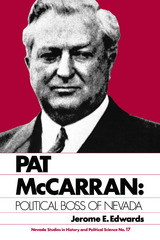
Within his native state of Nevada, McCarran constructed a machine designed to dominate the state’s political and economic life. This domination, which extended to both political parties, was built on personal favors for constituents, shrewd use of patronage, rewards for friends, and inevitable punishment for those suspected of being enemies. Ironically, the Senator employed the same tactics that others had once used against him to stymie his own early political efforts.
This work discusses the Senator’s background, his rise to power, and his methods of establishing political domination. Personal correspondence, excerpts from speeches, newspaper editorials, and interviews all help bring to life a colorful account of a controversial, driven man who held the levers of political control in Nevada during the early twentieth century.
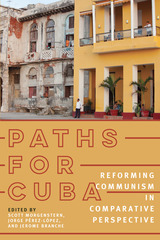
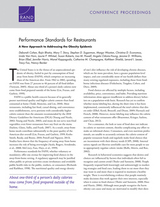

Here is the first detailed investigation of plantation slave life in Barbados from earliest times until 1838. The authors have visited slave village sites, and their intensive excavation of a slave cemetery has yielded a wealth of material pertaining to mortuary practices and other dimensions of social and material life. Handler and Lange have also examined and extensively integrated the written records to amplify and cross-check their findings.
Based on the methodologies of archaeology, history, and ethnography, Plantation Slavery in Barbados explores new ways to reconstruct the culture of a social group that left few historical records. As a description of the organization and development of the plantation system in Barbados, it is a model work in the burgeoning fields of slavery studies, historical anthropology, and Caribbean history.
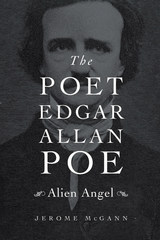
The poetry of Edgar Allan Poe has had a rough ride in America, as Emerson’s sneering quip about “The Jingle Man” testifies. That these poems have never lacked a popular audience has been a persistent annoyance in academic and literary circles; that they attracted the admiration of innovative poetic masters in Europe and especially France—notably Baudelaire, Mallarmé, and Valéry—has been further cause for embarrassment. Jerome McGann offers a bold reassessment of Poe’s achievement, arguing that he belongs with Whitman and Dickinson as a foundational American poet and cultural presence.
Not all American commentators have agreed with Emerson’s dim view of Poe’s verse. For McGann, a notable exception is William Carlos Williams, who said that the American poetic imagination made its first appearance in Poe’s work. The Poet Edgar Allan Poe explains what Williams and European admirers saw in Poe, how they understood his poetics, and why his poetry had such a decisive influence on Modern and Post-Modern art and writing. McGann contends that Poe was the first poet to demonstrate how the creative imagination could escape its inheritance of Romantic attitudes and conventions, and why an escape was desirable. The ethical and political significance of Poe’s work follows from what the poet takes as his great subject: the reader.
The Poet Edgar Allan Poe takes its own readers on a spirited tour through a wide range of Poe’s verse as well as the critical and theoretical writings in which he laid out his arresting ideas about poetry and poetics.
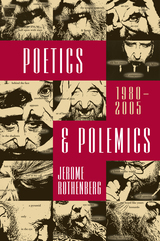
Poetics & Polemics, 1980-2005 brings together in one volume a wide-ranging selection of essays and commentaries by one of the most significant poets, critics, and translators working with American and international poetry today.
Jerome Rothenberg’s work spans a period of over forty years and nearly one hundred books, and though perhaps best known as a poet, his critical and theoretical contributions to the fields of innovative, experimental poetry have become equally important facets of his work. Rothenberg’s earliest critical writings concerned themselves with ethnopoetics and the poetics of performance. In the last twenty years his critical thinking has evolved to encompass more explicitly issues of modernism, postmodernism, and the avant-garde, as well as meditations on the nature of the book and writing. This volume extends and elaborates all of those interests, allowing for the first time a comprehensive glimpse of the full trajectory of his thinking.
In the first section, “Poetics and Polemics,” Rothenberg’s essays address a range of issues with which he’s become closely associated, among them the anthology as a critical and polemical tool; the intersection of poetry with art, performance, and politics, in both contemporary and traditional practice; the poetics of Jewish mysticism as a traditional form of conceptual and language poetry; and the universality of poetic discourse, particularly as seen in tribal poetry or in poetic traditions long separated from the Western literary mainstream. In “A Gallery of Poets” is Rothenberg’s lively explorations of the work of other poets, as they relate to his own work, to avant-garde poetry in general, and to the poetic traditions that concern him the most. Finally, in “Dialogues and Interviews” are Rothenberg’s unbridled meditations and musings on what he calls “the life of poetry” outside the bounds of book and binding, class and category, a dynamic force at the center of all that we call human.
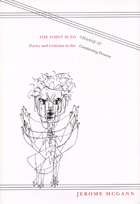
A preeminent critic maps the frontier of contemporary poetry.
In this book, Jerome McGann argues that contemporary language-oriented writing implies a marked change in the way we think about our poetic tradition on one hand and in the future of criticism on the other. He focuses on Walter Benjamin and Gertrude Stein as important intellectual resources because both see the history of poetry as a crisis of the present rather than as a legacy of the past. The crisis appears as a poetic deficit in contemporary culture, where values of politics and morality are judged prima facie more important than aesthetic values. McGann argues for the fundamental relevance of the aesthetic dimension and the contemporary relevance of cultural works of the past.
McGann moves through several broad categories in his examination of contemporary poetry, including the ways in which poetry must be abstract, change, and give pleasure. The author draws on sources ranging from the poetry of Bruce Andrews and Robert Duncan to Looney Tunes cartoons. The experimental move in contemporary poetry, McGann contends, is an emergency signal for readers and critics as much as it is for writers and poets, a signal that calls us to rethink the aesthetics of criticism. The interpretation of literary works has been dominated by enlightenment models—the expository essay and monograph—for almost two hundred years. With the emergence of new media, especially digital culture, the limitations of those models have grown increasingly apparent.
The Point Is To Change It explores alternative critical methods and provides a powerful call to reinvent our modes of investigation in order to escape the limitations of our inherited academic models. The goal of this process is to widen existing cracks or create new ones because, as McGann points out via the lyrics of Leonard Cohen, "That's how the light gets in."

The indigenous people of the hemisphere have resisted a five-hundred-year assault, fighting to maintain their cultural identities. During this time, authorities in the Americas have insisted that the toleration of indigenous societies and cultures would undermine their respective states. In recent years, however, the nations of the Americas have started to reverse themselves. They are altering their constitutions and proclaiming themselves multiethnic. Why is this happening now? The Politics of Ethnicity: Indigenous Peoples in Latin American States, edited by David Maybury-Lewis, helps us understand the reasons and history behind these times of transition.
The book provides a valuable overview of current problems facing indigenous peoples in their relation with national states in Latin America, from the highlands of Mexico to the jungles of Brazil. The traditional, sometimes centuries old, relations between states and indigenous peoples are now changing and being rediscussed. The collection, authored by U.S. and Latin American anthropologists using interdisciplinary approaches, enables the reader to understand these recent developments in a comparative framework. An ambitious and quite thorough collection, it is brought together skillfully by one of the discipline’s maître penseurs.
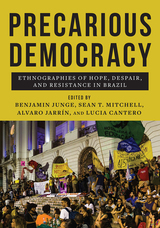
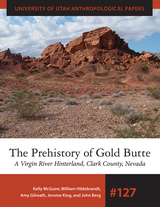
The Prehistory of Gold Butte uses a theoretical perspective rooted in human behavior ecology and other foraging models to present the results of one of the largest and most comprehensive archaeological investigations ever undertaken in southern Nevada, involving the systematic survey of more than 31,000 acres, the documentation of more than 377 sites, and the excavation of nine prehistoric sites. Gold Butte—at the crossroads of the Mojave Desert, the Great Basin, and the Colorado Plateau in southern Nevada—has a 12,000-year record of human occupation with archaeological elements that can be traced to all three culture zones.
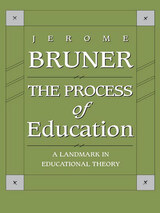
In this classic argument for curriculum reform in early education, Jerome Bruner shows that the basic concepts of science and the humanities can be grasped intuitively at a very early age. He argues persuasively that curricula should he designed to foster such early intuitions and then build on them in increasingly formal and abstract ways as education progresses.
Bruner’s foundational case for the spiral curriculum has influenced a generation of educators and will continue to be a source of insight into the goals and methods of the educational process.
READERS
Browse our collection.
PUBLISHERS
See BiblioVault's publisher services.
STUDENT SERVICES
Files for college accessibility offices.
UChicago Accessibility Resources
home | accessibility | search | about | contact us
BiblioVault ® 2001 - 2024
The University of Chicago Press









